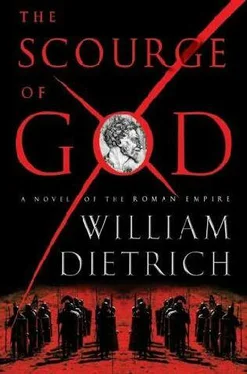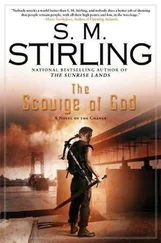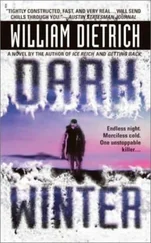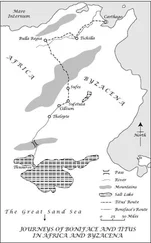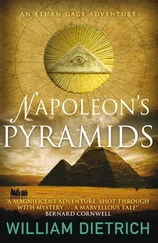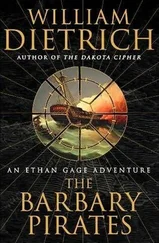William Dietrich - The Scourge of God
Здесь есть возможность читать онлайн «William Dietrich - The Scourge of God» весь текст электронной книги совершенно бесплатно (целиком полную версию без сокращений). В некоторых случаях можно слушать аудио, скачать через торрент в формате fb2 и присутствует краткое содержание. Жанр: Фэнтези, на английском языке. Описание произведения, (предисловие) а так же отзывы посетителей доступны на портале библиотеки ЛибКат.
- Название:The Scourge of God
- Автор:
- Жанр:
- Год:неизвестен
- ISBN:нет данных
- Рейтинг книги:5 / 5. Голосов: 1
-
Избранное:Добавить в избранное
- Отзывы:
-
Ваша оценка:
- 100
- 1
- 2
- 3
- 4
- 5
The Scourge of God: краткое содержание, описание и аннотация
Предлагаем к чтению аннотацию, описание, краткое содержание или предисловие (зависит от того, что написал сам автор книги «The Scourge of God»). Если вы не нашли необходимую информацию о книге — напишите в комментариях, мы постараемся отыскать её.
The Scourge of God — читать онлайн бесплатно полную книгу (весь текст) целиком
Ниже представлен текст книги, разбитый по страницам. Система сохранения места последней прочитанной страницы, позволяет с удобством читать онлайн бесплатно книгу «The Scourge of God», без необходимости каждый раз заново искать на чём Вы остановились. Поставьте закладку, и сможете в любой момент перейти на страницу, на которой закончили чтение.
Интервал:
Закладка:
“Skilla saw him on the walls of Aurelia. They fought, but again there was no decision.” He saw her confusion, not just at this news but at his willingness to tell her. He was quiet for a while, amused by her little dreams, and then spoke.
“Have you ever considered that I brought you to Gaul to give you back to him?”
She trembled. “Give me or trade me?”
“Sell you, if you want to call it that, for the sword.”
“You don’t even know he has the sword.” Attila sat abruptly upright and his fist crashed onto the arm of his chair, making her start. “Of course I do! Why else does Theodoric ride with Aetius? Why else do the tribes of Gaul refuse to join me? Why is there no news of Gaiseric and his promised Vandals? Because Rome has been given courage by the sword of Mars, that’s why! But that sword is mine, by discovery and by right. He stole it from me, and I want it back before the battle!”
“You brought me all this way for that?” It was odd how courage ebbed and flowed, and now came unbidden. She even smiled. “Surely you know the Romans would never trade the sword for me. Even Jonas wouldn’t do it.” Attila’s fingers drummed in that habit he had, his dark, sunken eyes regarded her dourly. “He will if you ask him to.
He’ll only do it if you ask him to.” Her heart began to hammer.
“Why do you think I’ve dressed you like a Roman whore, had the pig smell scrubbed off you, and painted your lips the color of your cunt? Why would I do this to a witch who helped the thief steal what was rightfully mine and who set my house on fire and who almost burned me in its flames?
To persuade your lover.”
“I wish we had all burned,” she said quietly.
“We will, witch, if I lose the coming battle because I have lost my sacred sword. We will burn together, you and I, on a pyre that I will build of my choicest possessions-and while I might stab my own heart to quicken things, you’ll be left to the flames.”
“You fear the Romans, don’t you?” she said in sudden realization. “You, the king who professes to fear nothing. The Westerners are uniting to fight you. That’s why we’ve stopped. You fear Aetius. You even fear Jonas. You regret that you’ve come here. It is all going wrong.”
He shook his shaggy head. “Attila fears nothing. Attila needs nothing. But it will spare many lives, Roman and Hun, if the final battle is an easy one instead of a hard one. If you meet Jonas, and he brings the sword, I will let you go with him.”
“What about Skilla?”
“Skilla is a Hun. He will forget you in a year. I’ll have a thousand women for Skilla, all of them more beautiful than you. Just help me get back what you stole.” She looked at him in wonder, this king trying to strike a bargain with the most helpless member of his retinue. “No.
If you want the sword back, then take it from Aetius.” Attila sprang out of his chair and towered over her, his face enraged, his voice a howl. “I want it stolen back from Aetius! Do it or I kill you right now! I can rape you, strip you, flay you, and give you to my soldiers to use and my dogs to eat!”
His rage was weakness, and it gave her hope. “You can do anything you wish, but it will not bring back the sword,” she said quietly. Here was power, she realized, the power to play on his fears. He had the look of a man haunted by nightmares. “I have cursed you, but it’s a curse you earned when Edeco treacherously killed my father. Rape me, and the curse is redoubled. Kill me, and I’ll be at your shoulder in the battle, whispering the breath of the grave. Abuse me, and you’ll lose your empire.”
His look was wild. “If we lose this fight, you will burn on my pyre!”
“And go happier that way than living to watch you win.”
XXVI
The Huns who had assaulted Aurelia were but a tree in a wood. Now we were approaching the immensity of the full forest.
Attila was gathering his forces on the Catalaunian Plain, and that is where Aetius would face him. A hundred kings and warlords rode from the council to direct a hundred armies into one mighty host. Some were from the decimated garrisons of cities and forts that had fallen. Some were proud retinues of the high kings of the Germans. Some were Roman legions whose standards and histories dated back centuries, marching now to this last and greatest battle. And some were the hastily organized regiments of men who had fled in fear and now, with a mixture of desperation and hope, wanted to recover their pride and avenge their burned homes. The Huns had put more than a million people to flight, creating chaos, but also churned up a vast reserve of potential manpower that Aetius was now furiously arming.
Some of these men were old veterans. Others were untried youths. Many were merchants and craftsmen with little knowledge of war. Yet all were able to hold a spear and swing a sword. In the havoc to come, skill might not count as much as numbers.
I felt swept up in the current of a river, carried toward Ilana by an irresistible flood. My decision not to go as an envoy to Marcian in Constantinople had reduced my importance from diplomat to soldier and aide, but I found my new anonymity strangely comforting. I need do nothing more complicated than take orders, fight, and wait for an opportunity to find the woman I’d been forced to leave behind. As the columns marched forward, long glittering spears of men on the straight Roman roads, it seemed to me we marched with the ghosts of countless Romans who had gone before us: with Caesar and Trajan, Scipio and Constantine, legion upon legion who had imposed order on a world of chaos.
Now we faced the greatest darkness. It seemed ominous and appropriate that in the heat of late June a range of thunderheads formed to the east, lightning crackling in the direction of Attila’s army. The air was humid and heavy, and the storm seemed symbolic of the test to come. Yet no rain fell where we were, and huge columns of dust rose as herds of men, horses, and livestock moved toward collision. Ordinary life had stopped, and every soldier in Europe was migrating toward the coming contest.
Zerco rode with me on his own short pony, saying he wanted to see the finish of what we had started. We trailed Aetius like loyal hounds. Accompanying us, strapped to a staff like a standard and carried as a talisman by a veteran decurion, was Attila’s iron sword. Its presence was proof, Aetius told his officers, that God was with us, not them.
We gained a slight rise and paused to see the progress of our alliance. It was thrilling to see so many marching under the old Roman standards, rank after rank on road after road, to the left and right as far as I could see. “It looks like veins on a forearm,” I remarked.
“I’ve seen boys of twelve and old men of sixty in the ranks,” Zerco said quietly. “Armor that was an heirloom.
Weapons that a few days before were being used to turn soil, not kill men. Wives carrying hatchets. Grandmothers with daggers to still the wounded. And a thousand fires that mark where Attila has been. This is a fight of revenge and survival, not a test of kings.”
He was proud, this little and ugly man, that we’d had some small role in this. “Don’t get lost in the battle, doughty warrior,” I advised him.
His seriousness retreated. “You’re the one who is going to cut his way through the entire Hun army. I’m going to stay on Aetius’s shoulders, like I said.” The landscape we traversed was rich and rolling, fat with lush pastures, ripening fields, and once-tidy villas. In many ways it was the loveliest land I’d ever seen, greener and more watered than my native Byzantium. If my body was to fall in Gaul, it would not be such a bad place to stay. And if I were to survive . . .
Читать дальшеИнтервал:
Закладка:
Похожие книги на «The Scourge of God»
Представляем Вашему вниманию похожие книги на «The Scourge of God» списком для выбора. Мы отобрали схожую по названию и смыслу литературу в надежде предоставить читателям больше вариантов отыскать новые, интересные, ещё непрочитанные произведения.
Обсуждение, отзывы о книге «The Scourge of God» и просто собственные мнения читателей. Оставьте ваши комментарии, напишите, что Вы думаете о произведении, его смысле или главных героях. Укажите что конкретно понравилось, а что нет, и почему Вы так считаете.
